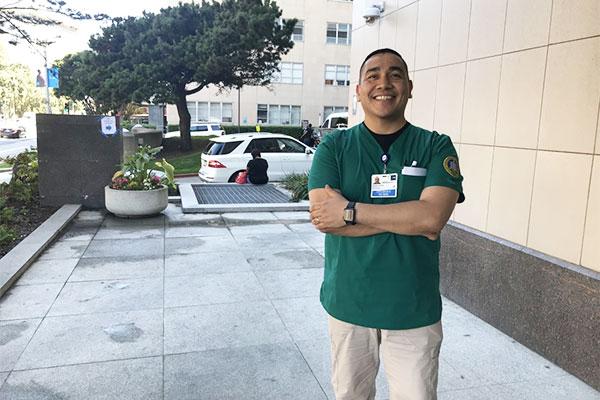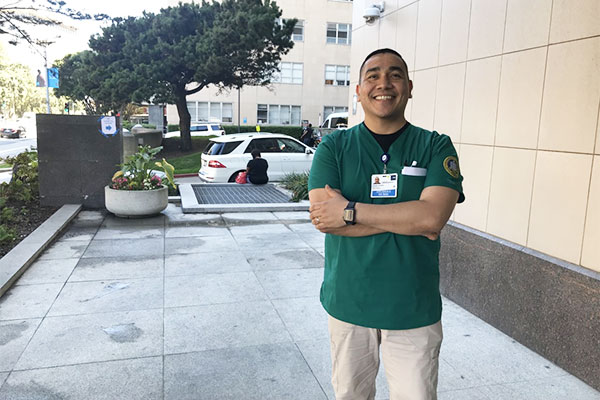

By Milenko Martinovich
Many health care professionals might envy Adrian Núñez’s career. He has held director-level positions at multiple organizations, gained valuable experience in public policy, and could seemingly continue on that successful career trajectory.
Despite Núñez’s professional success, fulfillment has eluded him. It’s why – at age 43 – he’s made a courageous choice to pursue his passion for service on a more personal level by enrolling in the School’s Master’s Entry Program in Nursing (MEPN).
Name: Adrian Núñez
Age: 43
Hometown: Stockton, Calif.
Program: Currently in the first year of the three-year Master’s Entry Program in Nursing (MEPN)
Specialty: Adult-Gerontology Primary Care Nurse Practitioner
What motivated you to enroll in MEPN?
I’ve been working for 19 years in the health care industry, mostly on the management side. I think the reason why I’m here today is because I knew that in order to be fulfilled moving forward, I needed to work directly with patients. When I was in college, I was actually aiming toward becoming a provider, but somehow public policy got my interest and I took that route. But now, coming full circle, I’m at a point where I want to pursue providing care. I’ve always loved science and so to be able to merge my love for it with my passion for social justice was an opportunity I could not let pass me by.
What was it about your previous positions that didn’t bring fulfillment?
Seeing the fruits of my labor was a challenge. You’re often pushing papers and talking about the patient, talking about the health of a community. It wasn’t close enough to the action. I like working with people, and I want to make a difference in people’s lives one at a time.
How difficult a decision was it to leave a successful career?
Extremely difficult. Growing up poor and then having a very comfortable salary and position was a very difficult thing to leave when all my life that was something my family wanted me to achieve. I came to realize money isn’t happiness and doing what you love to do is. I enjoyed my work; I just wasn’t in love with it.
Your husband, Emilio Orozco, MS ’10, completed MEPN. How influential was he in your decision?
Very. He also did a career change too at that point in time. I thought it was bold. I got to see how he was able to help people one at a time and make a difference.
What has been the most challenging aspect of the program?
Learning how to learn again is the biggest challenge -- and this program is intense. Seven days a week is dedicated to school. Study time is very limited, so we have to manage our time wisely. No one is well-prepared for this program, but being with my husband, I really understood the sacrifices one has to make.
What is it like to learn alongside so many younger students? (Average age of current MEPN cohort is 30.5 years)
All the students – every single one, I can say confidently – brings something very unique. We have an amazing group of people. So regardless of age, it’s pretty amazing to be around all of them. There’s a good chunk of people my age, too.
Where do you see your career going after MEPN?
I want to work with people who live with multiple chronic conditions like congestive heart failure, diabetes, and kidney disease that still have the opportunity to live a quality life. I had family members who died of those diseases. In retrospect, I see how preventable they were. It’s frustrating to see that now.
Did you consider any other schools to earn your nursing degree?
No. This was the only place I applied to. I put all my eggs in this basket, which made it a lot more terrifying. I had my heart set on this place. When I was in the middle of my career, I looked at UCSF as this thing I could never achieve, for whatever reason at the time. But I think all of it was working toward this point.
